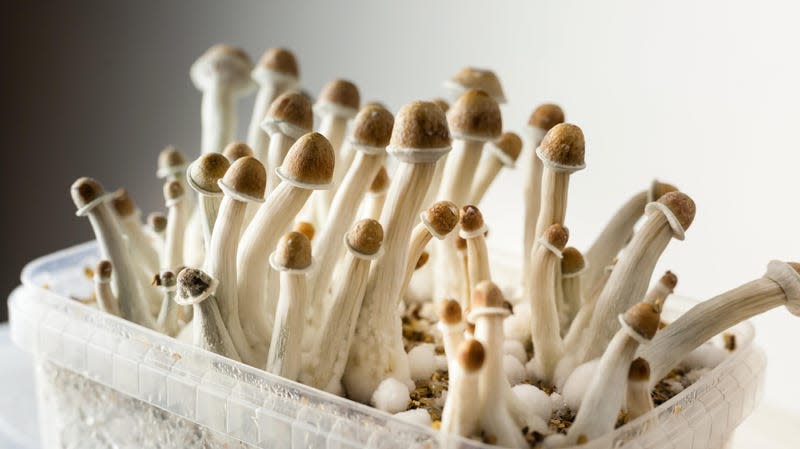Doing Shrooms Might Have Improved a Man's Color Blindness, Doctors Say

Magic mushrooms might have helped alleviate color blindness in at least one case. In a paper this week, doctors describe a man who experienced modest, long-lasting improvements in his red-green color vision after a single dose of psilocybin-containing mushrooms. The report is only an anecdote at this point but should merit further research, the authors say.
Psilocybin is the primary active ingredient in psychedelic mushrooms. It and other psychedelic drugs have started to be extensively studied for potential medical uses, such as helping to treat mental health conditions like depression and post-traumatic stress disorder. Some recent survey data of recreational drug users has also suggested that psychedelics could improve color vision deficiency, also called color blindness. But as far as the doctors behind the new case report know, there’s never been any published experimental data or case reports looking at this potential benefit, until now.
Read more
These Winning Close-Up Photos Show Life That's Often Overlooked
Remembering Enterprise: The Test Shuttle That Never Flew to Space
The report was written by doctors and researchers from the Cleveland Clinic in Ohio and the University of Alabama, Birmingham, and was published this week in the journal Drug Science, Policy and Law. Lead author Brian Barnett, a psychiatrist at the Cleveland Clinic, told Gizmodo that the subject of the report is actually a colleague of theirs.
The man is described as a 35-year-old man with mild deuteranomalia, a type of red-green blindness. He had periodically taken a variety of psychedelics over the years, including psilocybin, LSD, and DMT. After some of these sessions, he noticed an improvement in his red-green vision, which eventually inspired him to conduct his own experiment.
Just before he ingested a single dose of dried psilocybin mushrooms, the man took the Ishihara test, a common measure of red-green blindness. Then he kept taking the test at regular intervals for the next four months, reportedly only checking the answers at the end of the experiment. At some point, he talked about his experiment with the doctors, who then administered their own test 436 days after his initial psilocybin use.
The Ishihara test involves looking at plates of colored dots, most of which have patterns that are either invisible or only visible to people with color blindness. The baseline for normal red-green vision is typically considered scoring a 17 or higher on plates 1 through 21. The man’s self-reported score before the mushroom test was 14. Six hours after the test, he only slightly improved, scoring a 15. A day later, however, he scored 18. And eight days later, he reached his peak score of 19. By the time the doctors tested him over a year later, he still scored a 16, though he had subsequently taken mushrooms and other psychedelics prior to this test.
“This improvement lasted at least 16 days and possibly longer, though after that point the subject used other psychedelics, which make it impossible to determine whether the initial psilocybin dosage was responsible for ongoing improvements,” Barnett said in an email. Based on the past survey data, the temporary color vision boost provided by psychedelics could last anywhere from days to years.
Like most cases, the man’s color blindness is probably caused by genetic mutations in the retina’s cone cells. But it’s unlikely that psilocybin and other psychedelics can somehow fix the inherent flaws in these cells or are even really affecting the eye directly.
“We would not expect psilocybin to repair his genetic defect, so it could never fully restore his color vision. Instead, we hypothesize that psilocybin improved processing of the limited visual sensory input entering the brain of this individual,” Barnett said. The authors note that psychedelic users regularly report vivid alterations in how they see color, so this phenomenon might be an extension of that.
Of course, this is just a single case, based mostly on the self-reporting of one person with mild color blindness. Barnett doesn’t plan to follow up on the report, since it’s not his main field of study. But he hopes that other neurologists or ophthalmologists are intrigued enough to conduct more extensive research on the topic.
“A study using objective measures to analyze the effects of psilocybin and other psychedelics in multiple subjects with varying levels of colorblindness would give us a much better understanding of how generalizable the findings from this case report are,” he said. “Neuroimaging studies of these subjects could also shed important light on the neural underpinnings of this phenomenon and increase our understanding of visual processing in the brain in general.”
As for the man himself, Barnett still keeps in touch with him. Unfortunately, his color vision has since returned back to his baseline. But Barnett expects that he could regain the improvement by taking psychedelics again, given his past experiences.
This article has been updated with comments from the report’s lead author Brian Barnett.
More from Gizmodo
Sign up for Gizmodo's Newsletter. For the latest news, Facebook, Twitter and Instagram.

